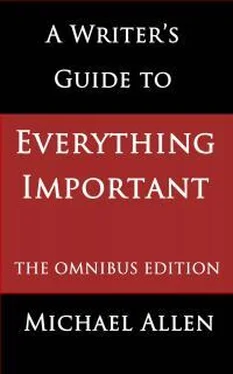Today, by comparison, almost anything goes. The broadsheet newspapers still tend to print f*** and s***, despite the fact that the uncensored versions of these words are now in the dictionary; and the tabloids have so far not ventured to show us any pubic hair. But no novelist any longer feels much constrained by the law on sexual content, or fears the wrath of the Archbishop of Canterbury. Such constraints as exist are imposed by publishers, who believe, rightly or wrongly, that they know what their customers will tolerate at any given time.
This being the case, why mention morality at all? Particularly when this is a chapter about emotion.
Well, I mention it because this is a chapter about emotion. If I am right in arguing that the novel (which, for the purposes of this discussion, may be regarded as a surrogate for all art forms) is best regarded as a machine for generating emotion, then we writers need to consider the morality of that process, if only for our own peace of mind.
The question is, can a writer feel assured that the process of creating positive emotions in readers is a moral one?
Sooner or later, even the least sensitive of us is going to wonder whether to include a particular scene or not. Is this scene going to do our chosen audience any harm? Is it going to do any good? Either way, is it something we would care to have our name associated with?
The subject could, I dare say, make a book in itself, but it may save a great deal of time if I admit, without equivocation, that the novel is, in principle, capable of doing harm. So is a bottle of aspirin, if you take the contents all at once.
On the other hand, a bottle of aspirin is capable of doing good. Given a sensible attitude on the part of the aspirin user, the drug’s potential for good far outweighs the harm, and life would get awfully complicated if we were to ban everything that is capable of being misused. Cars and carving-knives can be used to kill people, but I don’t think we are likely to forbid any one to possess them as a result.
The risk of the novel, or any other art form, doing any serious harm to adults seems to me to be minimal. Children, of course, will require guidance in their access to the arts, just as no child should sensibly be allowed to drink a bottle of whisky.
To my mind, an involvement in writing fiction is consequently not something that you need to be ashamed of. Quite the reverse: knowing what we do about the effects of emotion, I suggest that writing fiction can be viewed, in a modest way, as the equivalent of practising medicine. Alternative medicine, perhaps, rather than full-scale surgery. Fiction helps people to feel better emotionally; and, given the interaction of mind and body, it may therefore help them to feel better physically.
If writers can be regarded as potential healers, and I believe they can, then it follows, in my thinking at least, that creating a novel is not only a moral activity but also – dammit – an honourable one.
20. Summary
This ebook has dealt with the role of emotion in writing – and, by extension, with the role of emotion in art generally.
Art, you will recall, I define as any activity which involves skill and which consciously and deliberately directs that skill towards generating emotion in the observer.
We have discovered that emotion is an area of enquiry which has been grossly neglected by science. This neglect arises from the fact that emotion is hard to investigate, yields little by way of results, and therefore offers scant hope of career advancement. Ha! And you thought scientists were objective, clear-thinking chaps who followed a trail wherever it led, regardless of such mundane issues as career grades and salaries. Well, now you know better.
In the absence of much serious input from the men in white coats, I have provided you with a working theory of how emotion is generated in general; this theory can usefully be applied to writing the novel, or to pretty much any other form of writing.
Emotions can be thought of as falling into two groups, positive and negative, and I have provided you with a taxonomy – sorry, list – of these which you can use as a starting point for your own thinking.
And you are going to do some thinking of your own, aren’t you? I hope so.
I have suggested that there are a number of conclusions which follow logically from the idea that the main purpose of the novel – or any work of art – is to generate emotion. One conclusion is that there are no great novels, in the sense that the term is generally understood. Though there is, of course, a whole industry – nay, several industries, of which higher education and publishing are the chief – dedicated to the maintenance of the belief in great novels.
If there are no great novels, there is no hierarchy of fiction, with the good stuff at the top and the trash at the bottom. Indeed, only the briefest of considerations will demonstrate that the trash is every bit as effective in generating emotion as the so-called good stuff. Usually, in fact, a lot better.
Forget the idea that some chaps – and, yes, ladies too – are more sensitive than other chaps. We just have different frames of reference, that’s all. Different memory banks, different emotions, different collections of molecules stored in our receptors.
There is no particular virtue, we have decided, in the artist seeking to express only those ‘genuine’ and somehow ‘real’ emotions which she herself has experienced. And there is certainly no mileage in the idea that the artist must feel that emotion at the time of creating the work of art.
On the contrary, there are good reasons for supposing that the most effective works of art are created by those with a clear mind, uncluttered at the time of creation by what is often self-deluding emotion.
The idea that I, the Great Artist, am somehow a natural genius whose every spit and cough is of priceless value, is childish, selfish, ludicrous nonsense.
And, finally, I have suggested that those who dabble in the arts – provided they do it in a responsible and mature manner, as described – should hold their heads high and be proud of what they do.
21. Afterword
The author of this book, Michael Allen, has written several other books (with more planned) that are designed to provide straightforward and practical advice for writers at all stages of their careers.
If you are now ready to read more about how to apply what you have learnt about emotion to the down-to-earth business of actual writing, try the following:
How to Write a Short Story that Works
How to Write a Novel that Works
In addition, much useful background on the worlds of book publishing, theatre, and screenwriting can be found in Michael Allen’s The Truth about Writing. Much of this present book on emotion can be found printed as Chapter 5 of that book.
To get a good overview of the kinds of fiction and non-fiction books that Michael Allen has available, visit his author page on either the American branch or the co.uk branch of Amazon.
Finally, please consider writing a brief review of this book on your local branch of Amazon.
Good luck!
A WRITER’S GUIDE TO VIEWPOINT:
How to Tell Your Story in the Most Effective Way
Michael Allen
Copyright 2013 by Michael Allen
***
1. About the author
If you are presented with a book that calls itself a writer’s guide to something or other, you may reasonably wonder just who is the author of said book, and what makes him any sort of authority. All I can do to answer that is tell you a little of my personal history.
At the time of writing I am 74 years old. I was first paid for writing for a weekly magazine in 1955. My first novel was published in 1963, exactly 50 years ago this year, since when I have written at least 25 others (under my own name and several pen names).
Читать дальше












